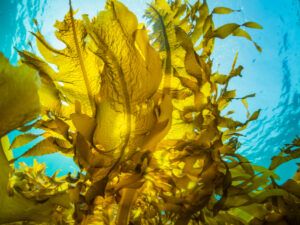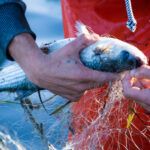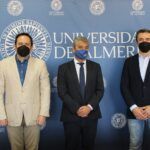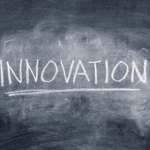Two EU-backed Dutch companies have created the first offshore solar and seaweed farm in the North Sea, making solar energy production and seaweed cultivation possible in the same space.
An offshore solar energy system developer and a seaweed company have created the world’s first combined solar and seaweed farm in the North Sea. The two Dutch companies in question, Oceans of Energy and The Seaweed Company, are partners in the EU-funded UNITED project aimed at promoting the more sustainable and efficient use of ocean resources.
The offshore farm has been installed at the North Sea Farmers test site 12 km off the coast of Scheveningen, a district of The Hague. By combining solar energy production and seaweed farming in the same area, the project partners are demonstrating the potential of cultivating seaweed for food in the spaces between offshore wind turbines.
Floating solar panels at two sites in the North Sea
In 2019, Oceans of Energy installed one of the world’s first offshore solar farms in the North Sea, off the Dutch coast. According to an article posted on the ‘Energy Global’ website, the system at this site generated clean energy for a year, withstood the sea climate, and survived waves up to 4 m as well as the storms Ciara and Dennis in the winter of 2019.
The project team next sought to test the solar panels under more challenging conditions. The system at the current test site, which is further offshore, has been built to withstand waves of up to 13 m. “The system is ready for the realisation of combined offshore solar and wind projects, creating 100 to 5000 MW of offshore solar energy per project. By using only 5% of the Dutch North Sea, half of the energy demand of the Netherlands can be generated. This can be accomplished by using the space between wind turbines,” the article states.
“After having experimented with the first offshore solar system on the North Sea I am thrilled to combine the production of food with generating clean energy, two very important needs,” stated Oceans of Energy’s founder and CEO Allard van Hoeken in a news item posted on the ‘DutchNews.nl’ website. Currently mostly encountered in Asia, seaweed farming for food production has the potential to reduce pressure on our oceans’ fish stocks. However, it’s not only a valuable food source. It can also be used to produce cosmetics, fuel and building materials. There’s enormous business potential in high-quality seaweed production, according to the UNITED website, and combining this activity with wind farming could reduce costs and increase efficiency.
The UNITED (Multi-Use offshore platforms demoNstrators for boostIng cost-effecTive and Eco-friendly proDuction in sustainable marine activities) project is also running pilot demo sites in Belgium, Denmark, Germany and Greece. In addition to offshore wind energy and seaweed cultivation, these four pilots are also testing blue mussel aquaculture, fish aquaculture, and flat oyster aquaculture and restoration. The project ends in June 2023.







Leave a Reply